Black People are largely in assist of gender equality between men and women and are vital of society’s lack of progress in the USA.
For a lot of Black adults, their assist of gender equality aligns with their non secular or ethical beliefs. Giant majorities say opposing gender discrimination is crucial to what these beliefs imply to them.
Nevertheless, those that attend non secular companies not less than a couple of instances a yr say their congregations usually don’t share their egalitarian views. Whereas Black adults suppose women and men ought to share monetary duties for his or her households equally, their congregations emphasize this function for males greater than they do for ladies.
Findings on this chapter are drawn from two Pew Analysis Heart surveys of U.S. adults performed in 2019 and 2020.
Black adults differ by gender and schooling of their views on the progress of gender equality
The vast majority of Black adults say it is extremely necessary for ladies to have equal rights with males within the U.S. (79%), in line with a Heart survey performed March 18 to April 1, 2020. Solely 18% say it’s considerably necessary, whereas 3% say it’s not too or in no way necessary.
Three-quarters or extra of Black males (76%) and Black ladies (82%) say it crucial for ladies to have equal rights with males, as do 81% of Black adults 18 to 49 and 77% of these 50 and older.
Black People’ views on gender equality differ by academic attainment. About nine-in-ten Black adults with a bachelor’s diploma or greater stage of schooling (89%) say that ladies having equal rights with males is essential. Although nonetheless a majority, Black adults with some faculty expertise (78%) and people with a highschool diploma or much less (75%) are much less prone to say this.
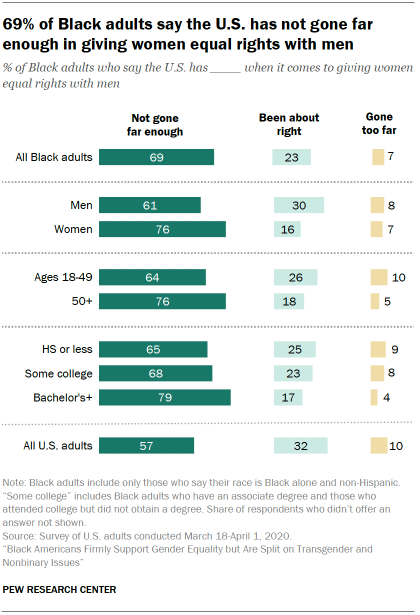
Whereas most Black adults favor gender equality, they’re additionally vital of the shortage of progress towards it in the USA. About seven-in-ten Black adults (69%) say the U.S. has not gone far sufficient relating to giving ladies equal rights with males. A lot smaller shares say the pace of this progress has been about proper (23%) or has gone too far (7%). Black adults’ views on this query differ by gender, age and schooling.
About three-quarters of Black ladies (76%) and Black adults 50 and older (76%) say the U.S. has not gone far sufficient relating to gender equality, in contrast with 61% of Black males and 64% of Black adults beneath 50.
About eight-in-ten Black adults with a bachelor’s diploma (79%) say the nation has not gone far sufficient in giving ladies equal rights with males, as in contrast with 68% of Black adults with some faculty expertise and 65% with a highschool diploma or much less.
General, Black adults (69%) are extra doubtless than all U.S. adults (57%) to say the U.S. has not gone far sufficient relating to gender equality.
Amongst Black adults who say the U.S. has not gone far sufficient in giving ladies equal rights with males, three-quarters say it’s not less than considerably doubtless that ladies within the U.S. will finally have these rights (75%). Nevertheless, solely 24% say it is extremely doubtless, much like the share that claims it’s not too or in no way doubtless (25%).
Black ladies who say the nation has not gone far sufficient in giving ladies equal rights are extra pessimistic concerning the prospect of reaching gender equality within the U.S. than Black males. About three-in-ten Black ladies say it’s not too or in no way doubtless that ladies will finally have equal rights with males (31%). Solely 17% of Black males say the identical.
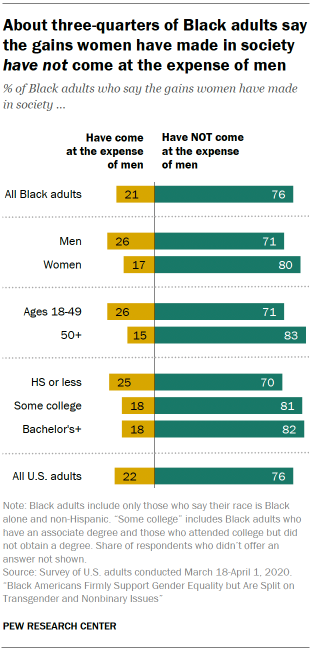
Black men and women not solely differ of their views on the progress of gender equality within the nation, additionally they differ on the prices. A few quarter of Black males say the features ladies have made in society have come on the expense of males (26%). Smaller shares of Black ladies (17%) say the identical. Nonetheless, most Black males (71%) say these features have not come on the expense of males.
Though majorities of Black adults throughout age and schooling teams say the features that ladies have made haven’t come on the expense of males, Black adults 50 and older and people with faculty expertise (each with and with out bachelor’s levels) are the probably to say this.
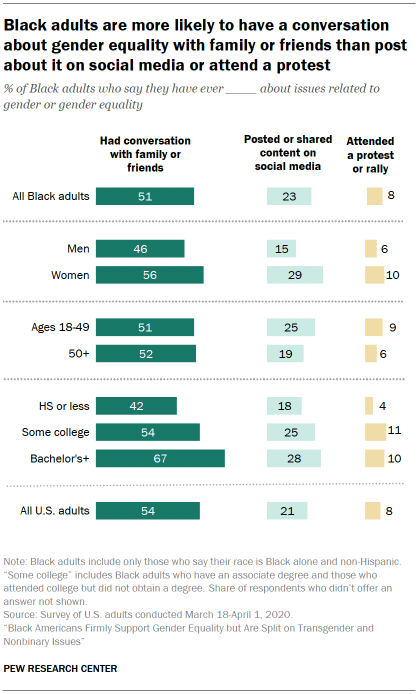
Relating to sharing their views about gender and gender equality, Black adults are extra doubtless to take action in conversations with household or mates (51%) than to publish or share content material on social networking websites (23%), contribute cash to a company engaged on gender points (13%), contact a public official to precise their opinion (9%) or attend a protest or rally (8%), in line with the 2020 survey.
Some 56% of Black ladies say they’ve conversations about gender or gender equality with household and mates, and 46% of Black males say they do the identical. Black ladies (29%) are extra doubtless than Black males (15%) to publish about gender points on social media.
Black adults who’ve a bachelor’s diploma (67%) are extra doubtless than these with a highschool diploma or much less (42%) to have conversations about gender and gender equality with kinfolk and mates.
And Black adults ages 18 to 49 (51%) are about as doubtless as these 50 and older (52%) to have conversations about gender and gender equality with their household or mates.
Gender, religion and household
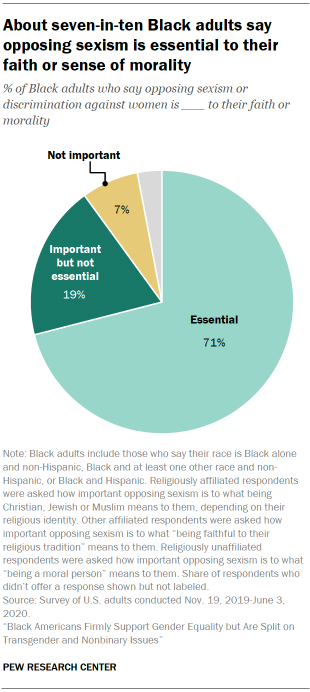
Many Black People see their views on gender equality as a core a part of their faith or sense of morality, in line with a Heart survey of U.S. adults, with a big pattern of Black adults, performed Nov. 19, 2019, by June 3, 2020.
Two-thirds of Black adults are Protestant Christians (66%), whereas others are Catholic (6%), members of different Christian faiths resembling Jehovah’s Witnesses (3%), members of non-Christian faiths resembling Islam (3%), or unaffiliated with a faith (21%).
About seven-in-ten Black adults, no matter their non secular affiliation, say opposing sexism or discrimination towards ladies is crucial to their religion or sense of morality (71%). A lot smaller shares of Black adults say opposing sexism is necessary however not important to their religion or sense of morality (19%) or not necessary in any respect (7%).
Roughly seven-in-ten Black adults throughout genders and age teams say opposing sexism is crucial to their religion or sense of morality. Nevertheless, Black adults with a highschool diploma or much less (64%) are much less doubtless than these with a bachelor’s diploma (76%) or those that have some faculty expertise (73%) to say this.
Though the vast majority of Black adults say opposing sexism is crucial to their religion or sense of morality, solely about three-in-ten Black adults who attend non secular companies not less than a couple of instances a yr (28%) say they heard a sermon on sexism within the yr previous to the survey.
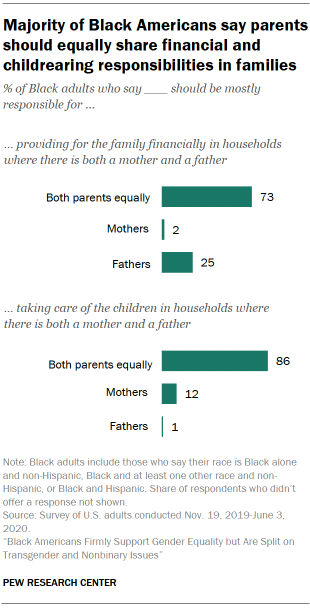
Black People’ broad acceptance of gender equality carries over to their views of gender roles of their households. The bulk say moms and dads ought to be equally liable for household funds in households the place each are current (73%), whereas 1 / 4 say that fathers ought to take the lead.
Black ladies (76%) are considerably extra doubtless than Black males (69%) to say moms and dads ought to share monetary duties equally. Although nonetheless a majority, Black adults ages 18 to 49 (75%) are barely extra prone to say this than these 50 and older (70%). And about three-quarters of Black adults throughout all schooling ranges say that moms and dads ought to share household monetary duties equally.
An excellent bigger majority of Black People imagine that moms and dads ought to cut up youngster care duties in households the place each mother and father are current (86%). Most demographic subgroups of Black adults share this view, with few variations amongst them.
Though Black adults take these egalitarian stances on gender roles of their private lives, lots of them belong to congregations with completely different views. Roughly 60% of Black adults attend non secular companies not less than yearly. This consists of 33% who attend weekly or extra. And amongst those that attend yearly, 60% go to homes of worship the place the vast majority of the congregation and the clergy is Black – which means that Black adults are listening to these gendered messages about Black households from Black non secular leaders in predominantly Black non secular areas.
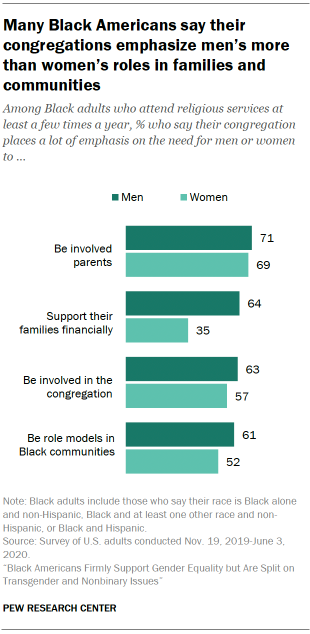
About seven-in-ten Black adults who attend non secular companies not less than a couple of instances a yr say their congregations place plenty of emphasis on the necessity for each males (71%) and girls (69%) to be concerned mother and father.
However relating to being concerned in congregations and being function fashions in Black communities, considerably fewer hear these messages emphasised for ladies than males. As an example, 61% of Black congregants say their homes of worship strongly emphasize the necessity for males to be good function fashions, and 52% hear this emphasised for ladies.
There’s an particularly giant hole on the problem of economic assist inside households: Solely a few third of Black adults who attend non secular companies not less than a couple of instances a yr (35%) say that their congregations stress that ladies ought to assist their households financially, in contrast with 64% who say their congregations emphasize this for males.






























































